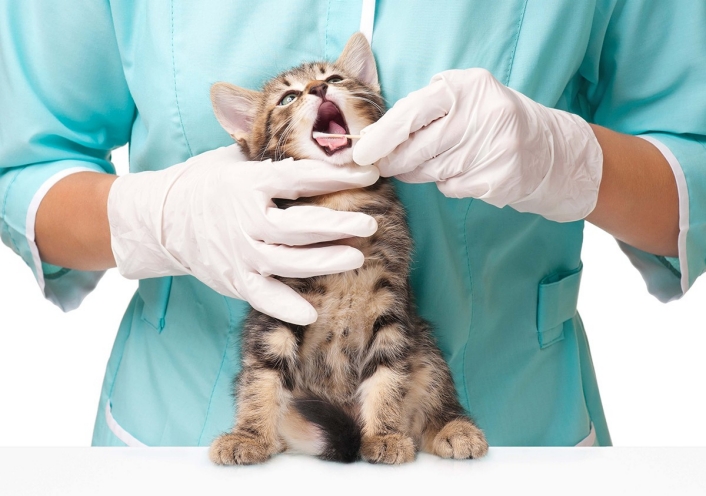Vaccination Guidelines From Your Trusted Vet
Inoculation standards provided by your trusted vet play a vital function in securing your animal's wellness and wellness. Core vaccines are fundamental for all pets, while non-core injections can be tailored to certain way of livings and ecological exposures. Recognizing the subtleties of vaccination timetables, which start as early as 6 to eight weeks, is necessary for optimal security. Additionally, addressing usual misconceptions bordering injections can additionally enhance family pet owners' confidence in these precautionary actions. As we discover these important elements, it becomes progressively clear why regular appointments with your veterinarian are essential for informed decision-making.

Significance of Inoculations
Inoculations play a critical function in securing pet dogs versus a series of avoidable diseases. By promoting the body immune system to recognize and combat particular virus, vaccinations dramatically minimize the occurrence of transmittable illness that can affect a pet's health and wellness and durability. Not only do inoculations protect private pets, yet they likewise add to herd immunity, therefore lowering the total frequency of conditions in the pet populace.
Prompt vaccinations help to minimize the spread of illness such as rabies, parvovirus, and distemper, which can have severe effects for both animals and human beings. In addition, vaccinations are frequently a need for boarding facilities, brushing solutions, and canine parks, making them crucial for those who wish to mingle their pets.

Core Vaccines for Pets
While the certain vaccination requirements of pets can vary based on specific elements, core injections are globally advised to shield against the most typical and severe illness (Veterinarian Enterprise). Core vaccinations are those considered necessary for all pet dogs, regardless of their way of life or geographic location, as they safeguard versus extremely contagious and potentially deadly illnesses
For dogs, the core vaccinations include those for canine distemper, parvovirus, adenovirus (liver disease), and rabies. Canine distemper is a viral condition that affects the respiratory, stomach, and nerve systems. Parvovirus is understood for triggering serious stomach illness, especially in young puppies. Adenovirus can cause liver disease, while rabies is a zoonotic disease that postures a risk to both people and pet dogs.
In pet cats, core injections encompass feline panleukopenia, feline calicivirus, feline herpesvirus (rhinotracheitis), and rabies. Feline panleukopenia is a very infectious viral condition that impacts the body immune system and intestinal tracts. Calicivirus and herpesvirus are major factors to upper respiratory system infections in pet cats, while rabies stays a crucial worry for public health and wellness.
Seek advice from your vet to guarantee your family pets get their core vaccinations on time.
Non-Core Vaccines Explained
Non-core vaccines are customized to resolve details threats related to a family pet's direct exposure, way of living, and environment to specific conditions. Unlike core vaccines, which are universally recommended for all family pets, non-core vaccinations are taken into consideration based on specific conditions. These injections are particularly important for pets that may experience one-of-a-kind microorganisms due to their geographical area, traveling routines, or tasks.
Examples of non-core vaccines include those for Bordetella bronchiseptica, which is linked to kennel coughing, and Lyme illness, brought on by ticks. Animals that frequently communicate with other pets, such as those in boarding centers, pet dog parks, or brushing environments, might take advantage of Bordetella inoculation. Similarly, if you live in an area where Lyme disease prevails, immunizing versus this condition can be a sensible selection for outdoor-loving canines.
Other non-core vaccines may consist of those for leptospirosis, canine flu, and feline leukemia, depending on the details risk aspects present. It is important to have a detailed conversation with your vet about your pet dog's lifestyle and the prospective a fantastic read demand for these vaccines, making certain a tailored inoculation approach that ideal safeguards your hairy buddy.
Inoculation Arrange Review

As animals grow, it is essential to follow the advised booster inoculations. Vet Enterprise. For adult pets, core injections are normally given each to three years, relying on the particular vaccination and regional guidelines. Non-core vaccines might be advised based on way of life aspects and local condition frequency, necessitating a tailored method
Normal vet check-ups are important for upgrading inoculation timetables. Your veterinarian can offer support on one of the most appropriate booster shots for your pet dog, factoring in age, health and wellness status, and ecological threats. By staying positive and educated, pet owners can ensure their hairy companions obtain effective and prompt inoculations, thereby securing their health and well-being throughout their lives.
Typical Myths About Vaccinations
Misconceptions concerning family pet vaccinations can lead to complication and unwillingness among animal proprietors pertaining to address the booster shot process. One prevalent misconception is that injections are unnecessary for indoor pets. While it's true that indoor pets deal with reduced risks, they are not completely unsusceptible to diseases, as pathogens can be introduced with numerous ways, consisting of human clothing and various other pet dogs.
An additional mistaken belief is that vaccines can cause the illness they intend to prevent. Actually, the majority of injections contain inactivated or attenuated pathogens, which can not cause illness in healthy pets. Some animal owners also believe that their family pets need to not be vaccinated if they are already healthy and balanced; nonetheless, vaccinations are a positive step that helps protect against the beginning of disease.
Additionally, many family pet owners are afraid that injections will certainly bring about lasting health complications. While adverse effects can take place, they are short-term and usually light. why not look here The benefits of inoculation-- protecting animals from potentially serious diseases-- far exceed the dangers. Understanding these usual misconceptions is essential for accountable pet possession and guaranteeing the health and wellness of your furry friends. Constantly consult your vet for precise info customized to your animal's specific requirements.
Final Thought
In summary, adherence to vaccination guidelines is essential for making sure the health and longevity of pets. Core vaccinations give essential defense versus severe illness, while non-core vaccines deal with specific risks based on individual way of lives. Developing a detailed vaccination routine, in conjunction with normal vet check-ups, facilitates optimum health and wellness administration. Dispelling usual myths bordering vaccinations further enhances the value of informed decision-making in pet dog care. Ultimately, an aggressive method to vaccinations is crucial for preserving pet dog wellness.
Not only do inoculations protect individual animals, but they likewise contribute to herd resistance, therefore reducing the total prevalence of diseases in the family pet population.
Misunderstandings about family pet vaccinations can lead to complication and reluctance amongst pet dog owners pertaining to the immunization process. While it's true that interior pet dogs face lower threats, they are not completely immune to illness, as pathogens can be introduced via different methods, consisting of human clothes and various other pets.
Some family pet owners likewise think that their pets should not be vaccinated if they are already healthy; nevertheless, vaccinations are a positive procedure that aids protect against the start of illness.
The benefits of vaccination-- securing family pets from possibly deadly illness-- much surpass the risks.